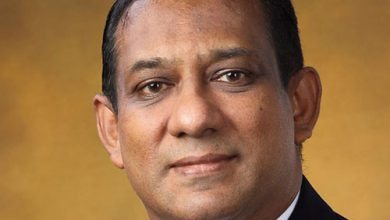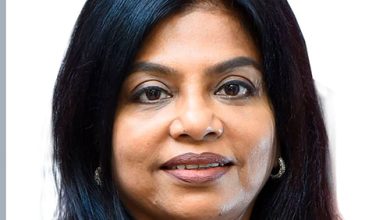EXPORT SECTOR

SHIFTING DYNAMICS
Compiled by Yamini Sequeira
THERE’S NO SILVER BULLET
Shyam Sathasivam discusses the need to move from ‘just in time’ to ‘just in case’
Reflecting on a turbulent five year period marked by crises – including the Easter Sunday attacks, the COVID-19 pandemic and a severe economic downturn – Shyam Sathasivam notes: “Sri Lankan companies have undergone a real world stress test; somewhat like testing whether a building can withstand an earthquake. Those that survived have emerged more resilient.”
“But the scale and nature of the shocks we faced have often limited our room to manoeuvre,” he acknowledges.
He is candid about the journey: “We may not have capitalised on every opportunity but we’ve certainly learned important lessons. Among them, the urgent need to diversify exports, particularly as the US remains a dominant trading partner. Recent tariff shocks emanating from the United States highlight the dangers of overdependence.”
Sathasivam believes that “Sri Lanka’s small size, often viewed as a limitation, could be an advantage in a volatile global environment by enabling faster pivots and more agile responses.”
And he is upbeat about the economic recovery, describing it as “almost textbook” – a view echoed by institutions such as the World Bank. However, Sathasivam emphasises the importance of policy stability and investor confidence to maintain the momentum.
JUST IN CASE DICTUM But shifting global dynamics are opening new doors. “Countries are reassessing their supplier bases. It’s a real opportunity,” he asserts.
Industries such as pharmaceuticals, once hard to break into due to entrenched supplier relationships, are increasingly opening up. The global shift from ‘just in time’ to ‘just in case’ sourcing is creating space for new entrants – and Sri Lanka could benefit, if it acts decisively.
The pandemic, he says, redefined global supply chains. Efficiency gave way to resilience; and businesses now see redundancy as a strategic asset. Sathasivam asserts that “COVID-19 showed us the limits of the just in time model. Just in case is no longer a luxury; it’s a necessity.”
This shift could work in Sri Lanka’s favour. As global manufacturers reassess their footprints, agility and capability in digital services could position the country competitively.
For diversified businesses, adaptability has proven invaluable.
Operating across multiple sectors or running varied models within one industry has provided a buffer against volatility. “What may look like a single business from the outside often runs like three from the inside,” he says. Looking ahead, he calls for “a sharper focus on value creation.”
“Sri Lanka must define and own its value proposition. It’s not about volume anymore; it’s about differentiation,” he emphasises.
He points to sectors such as apparel and technology, where Sri Lanka has built global credibility not merely through relatively low costs but process excellence and innovation. “The shift from mass outsourcing to high value services is key if we’re to move up the chain,” he asserts.
Despite the challenges, Sathasivam believes that “Sri Lanka has a unique strength: its people.”
“Our healthcare and education indicators stand out in the region. We have one of the lowest maternal mortality rates in the emerging world and a reasonably well-educated workforce,” he points out.
But Sathasivam warns that this advantage must be nurtured: “Human capital development cannot be left to chance. With the right investments, we can build globally competitive talent – from ICT to advanced casablanka-hotel.”
REGIONAL SYNERGIES “Hard goods may move closer to customers but soft goods can be delivered from anywhere. The key is to know where we fit in,” he says.
And he suggests that “regional integration is another strategic priority. Deeper engagement with India and ASEAN could be transformative. Greater access to Indian markets – and vice versa – would drive exponential trade and investment flows.”
Sathasivam adds that members of Association of Southeast Asian Nations economies offer valuable lessons: “Companies that approach Sri Lanka with an ASEAN mindset – rather than a South Asian focus – tend to do better. Our market dynamics align more with Malaysia or Vietnam than with Bangladesh or Pakistan.”
A mindset shift is required as to how Sri Lanka positions itself – i.e. not as a South Asian outlier but a nimble player within the Asia-Pacific.
Meanwhile, changing consumer behaviour is rewriting rules across sectors, he notes: “We’re at the tail end of traditional preferences. Younger consumers expect convenience, relevance and speed – shaped by tech and global exposure.”
Old brand loyalties are eroding, he says, adding that “a brand that resonated with our parents might mean nothing to a teenager today. This generation has been raised on mobile and social media. Messaging has to evolve.”
Rising incomes will deepen consumer sophistication. Sathasivam cites evolving trends in ASEAN markets as a pointer to what could lie ahead for Sri Lanka: “Even iced tea – which never really took off here – could thrive in new formats aligned with modern lifestyles.”
YOUNG TURKS Turning to the entrepreneurial ecosystem, Sathasivam is optimistic. “We’re seeing fresh energy – young founders and second-gen entrepreneurs who are moving beyond legacy models. It’s encouraging.”
“While pharmaceutical manufacturing is one sector showing early promise, certification and standards remain key hurdles,” he adds. And he points to the Ceylon Cinnamon GI certification as a success story, noting that rigorous standards can open new markets: “If we raise the bar, everyone benefits.”
On the broader development front, Sathasivam stresses the need for balanced public-private engagement, especially in sensitive sectors like food and healthcare. “The private sector has a vital role to play and sooner or later, it will need to stop looking for reasons not to act,” he remarks, pointedly.
But it’s about partnership and not dominance,” he cautions. The state, he adds, “should focus on regulation, infrastructure and fairness, leaving last mile execution to those best suited.”
Meanwhile, he underscores the need for strong institutional foundations – from law and order to infrastructure – as essential for private sector growth.
US TARIFF CHAOS As for global trade shifts such as the US tariffs, Sathasivam is pragmatic: “There are immediate downsides. But bigger opportunities lie in the medium term.”
He explains that as global supply chains diversify, Sri Lanka must position itself as a credible alternative. That means improving logistics, expanding export markets, and building relationships based on trust and quality.”
As Sri Lanka stands on the cusp of a new chapter, Sathasivam sees a confluence of economic, institutional and generational change. The ingredients for success are there but clarity, consistency and competitiveness will be key.
“There’s no silver bullet,” he concludes. “But with the right mindset and partnerships, we can create something genuinely differentiated.”









